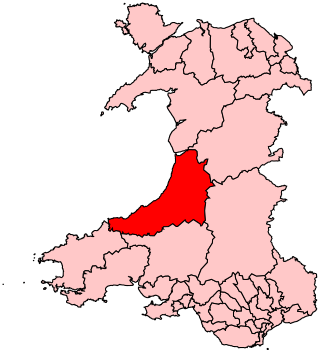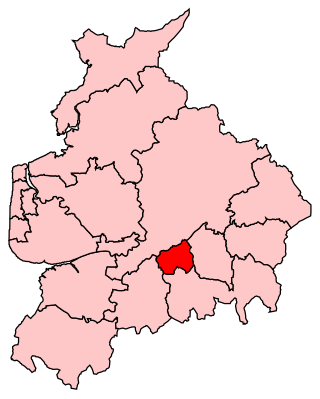Related Research Articles

The 1874 United Kingdom general election saw the incumbent Liberals, led by William Gladstone, lose decisively, even though their party won a majority of the votes cast. Benjamin Disraeli's Conservatives won the majority of seats in the House of Commons, largely because they won a number of uncontested seats. It was the first Conservative victory in a general election since 1841. Gladstone's decision to call an election surprised his colleagues, for they were aware of large sectors of discontent in their coalition. For example, the nonconformists were upset with education policies; many working-class people disliked the new trade union laws and the restrictions on drinking. The Conservatives were making gains in the middle-class, Gladstone wanted to abolish the income tax, but failed to carry his own cabinet. The result was a disaster for the Liberals, who went from 387 MPs to only 242. Conservatives jumped from 271 to 350. Gladstone himself noted: "We have been swept away in a torrent of gin and beer".

The Representation of the People Act 1867, known as the Reform Act 1867 or the Second Reform Act, is an Act of the British Parliament that enfranchised part of the urban male working class in England and Wales for the first time. It took effect in stages over the next two years, culminating in full commencement on 1 January 1869.

Ceredigion is a parliamentary constituency represented in the House of Commons of the UK Parliament. Created in 1536, the franchise expanded in the late 19th century and on the enfranchisement of women. Its boundaries remained virtually unchanged until 1983. From 1536 until 1885 the area had two seats : a county constituency (Cardiganshire) comprising the rural areas, the other the borough constituency known as the Cardigan District of Boroughs comprising a few separate towns; in 1885 the latter was abolished, its towns and electors incorporated into the former, reduced to one MP. The towns which comprised the Boroughs varied slightly over this long period, but primarily consisted of Cardigan, Aberystwyth, Lampeter and Adpar, the latter now a suburb of Newcastle Emlyn across the Teifi, in Carmarthenshire.

William Henry Hornby (1805–1884) an English cotton spinner, industrialist and politician. He became the first Mayor of Blackburn in Lancashire and national chairman of the Conservative Party.

Rhondda is a constituency in Wales represented in the House of Commons of the UK Parliament since 2001 by Chris Bryant of the Labour Party.

Blackburn is a constituency in Lancashire, England, which has been represented in the House of Commons of the UK Parliament since 2015 by Kate Hollern of the Labour Party. From 1979 to 2015, it was represented by Jack Straw who served under the Labour leaders of Neil Kinnock and John Smith and the Labour governments of Tony Blair and Gordon Brown.

St Ives is a parliamentary constituency covering the western end of Cornwall and the Isles of Scilly. The constituency has been represented in the House of Commons of the UK Parliament since 2015 by Derek Thomas, a Conservative MP.

Darwen was a county constituency in Lancashire, centred on the town of Darwen. It returned one Member of Parliament to the House of Commons of the Parliament of the United Kingdom from 1885 until it was abolished for the 1983 general election.
Leeds South was a parliamentary constituency in the city of Leeds, West Yorkshire, which returned one Member of Parliament (MP) to the House of Commons of the Parliament of the United Kingdom from 1885 until it was abolished for the 1983 general election. It was then largely replaced by the new Morley and Leeds South constituency.
Leeds North was a borough constituency in the city of Leeds, West Yorkshire, which returned one Member of Parliament (MP) to the House of Commons of the Parliament of the United Kingdom, elected by the first past the post voting system.
Cirencester was a parliamentary constituency in Gloucestershire. From 1571 until 1885, it was a parliamentary borough, which returned two Member of Parliament (MPs) to the House of Commons of the Parliament of the United Kingdom until 1868, and one member between 1868 and 1885. In 1885 the borough was abolished but the name was transferred to the county constituency in which it stood; this constituency was abolished for the 1918 general election.
Liskeard was a parliamentary borough in Cornwall, which elected two Members of Parliament (MPs) to the House of Commons from 1295 until 1832, and then one member from 1832 until 1885. The constituency was abolished by the Redistribution of Seats Act 1885.
William Wells was an English Liberal Party politician who sat in the House of Commons from 1852 to 1857 and from 1868 to 1874.
The 1903 Rochester by-election was a Parliamentary by-election held on 23 September 1903. The constituency returned one Member of Parliament (MP) to the House of Commons of the United Kingdom, elected by the first past the post voting system.
Edward Kenworthy Hornby was an English Conservative Party politician. He sat in the House of Commons from 1869 to 1874.
Henry Master Feilden was an English Conservative Party politician.
Montague Joseph Feilden was a British Liberal and Whig politician.
Joseph Feilden was a British landowner who represented Blackburn in Parliament from 1865 to 1869.
References
- 1 2 3 "Election Petitions. Blackburn". The Times . London. 17 March 1869. p. 12, col C.
- 1 2 3 4 5 6 7 8 "Election Intelligence. Blackburn". The Times . London. 30 March 1869. p. 5, col E.
- 1 2 3 4 5 Craig, F. W. S. (1989) [1977]. British parliamentary election results 1832–1885 (2nd ed.). Chichester: Parliamentary Research Services. pp. 49–50. ISBN 978-0-900178-26-9.
- ↑ "John Morley". Spartacus. Archived from the original on 6 December 2010. Retrieved 15 December 2010.
- 1 2 3 4 5 6 7 8 9 "Election Intelligence. Blackburn". The Times. London. 31 March 1869. p. 4, col F.
- ↑ "No. 23484". The London Gazette . 2 April 1869. p. 2051.
- ↑ Leigh Rayment's Historical List of MPs (part 3)
- ↑ Craig, page 21
- ↑ Craig, page 220
- ↑ "No. 28134". The London Gazette . 5 May 1908. p. 3312.